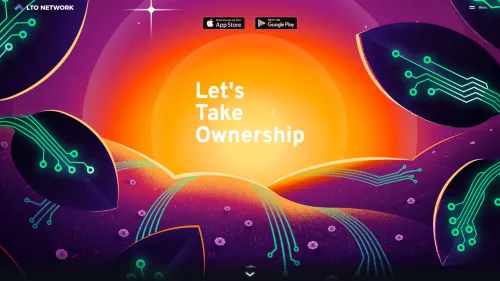LTO Network (LTO)
LTO Network is a privacy-focused, leased proof of stake (LPoS) Layer-1 blockchain designed for handling real-world assets, data security, and identity solutions. It aims to facilitate secure and efficient business processes by integrating a public layer for transparency and a private layer for data security, ensuring compliance with GDPR and MiCA regulations. This dual-layer structure makes it suitable for enterprises that require data privacy and adherence to regulatory standards.
LTO Network provides tokenization of real-world assets through its Ownables technology, allowing assets to be integrated into the DeFi and Web3 ecosystems. Its KYC services are designed to maintain compliance with anti-money laundering laws and offer Proof-of-Humanity services to protect Web3 and DeFi platforms from bots. The native cryptocurrency, LTO, is used within the blockchain's PoS consensus mechanism for transaction fees and rewards for securing the network.
Key features and specifications
- Currency name: LTO Network
- Ticker symbol: LTO
- Mainnet launch: 12 January 2019
- Status: Active
- Programming languages: Scala, TypeScript, Rust
- Source model: Open source
- License: Apache 2.0
- Block time: 60 seconds
- Circulating supply: 431,519,931 LTO (as of 7 September 2024)

| Ticker | LTO |
| Category | Cryptocurrency |
| Website | https://www.ltonetwork.com/ |
| @TheLTONetwork | |
| Telegram | LTOnetwork |
| https://www.reddit.com/r/LTONetwork/ | |
| Contract Addresses | |
|---|---|
| ethereum | 0xd0...30 Copied! Copied! |
| binance-smart-chain | 0x85...bd Copied! Copied! |
Official documents include the original whitepaper, digital identities techpaper, and Ownables litepaper, which provide detailed insights into the network's functionalities.
History of LTO Network
LTO Network originated in 2014 with a Dutch company named Firm24, which later established LegalThings to focus on company incorporation. As demand for workflow automation grew, LegalThings developed centralized software for major companies like Euronext and Heineken. To address data silo issues, LegalThings began developing decentralized blockchain solutions.
In May 2018, LegalThings One was created as a token project on the WAVES platform, which was later rebranded to LTO Network in September 2018. The network transitioned from the WAVES platform and launched its mainnet on 12 January 2019. Subsequent developments included a self-sovereign identity structure and the release of the LTO COBALT Mainnet update in October 2021.
As of 2022, LTO Network focuses on developing decentralized digital assets known as Ownables, which allow dynamic, consumable, and unlockable content. The network joined the Metaverse Standards Forum in July 2022, collaborating with companies like Microsoft and Nvidia to develop open standards for the metaverse.
Blockchain infrastructure of LTO Network
Hybrid structure
LTO Network operates on a Leased Proof of Stake blockchain, featuring a private layer for sharing sensitive information and a public layer for transaction recording and security. This hybrid structure ensures compliance with GDPR and MiCA regulations, promoting the adoption of blockchain-based solutions without privacy concerns.
The private layer uses Ricardian contracts in the form of live contracts, implemented through a Finite State Machine. This setup facilitates secure and efficient business operations.
Ownables and real-world assets
Ownables
Ownables are digital assets that reside in a user's wallet, storing not only images or media but also smart contracts and event chains. Unlike traditional NFTs, everything related to an Ownable is stored in the wallet, including entire applications, offering numerous possibilities. Ownables are hosted on LTO Network's private layer.
Real-world assets
The Ownables structure is central to LTO Network's approach to real-world assets. Leveraging its unique blockchain structure and involvement with real-world companies, LTO Network aims to bring true digital ownership with legal backing.
LTO token
The LTO token is the native currency of LTO Network, used for transactions on the mainnet and playing a role in the PoS consensus mechanism. Transaction fees are partly burned and partly awarded to nodes as rewards. The total supply of the LTO token stands at 431,519,931 LTO as of 7 September 2024. The LTO token exists in three variants: LTO Mainnet, ERC20, and BSC, with a bridge allowing seamless movement between variants.
Wallets and staking
Wallets
LTO Network's web wallet provides users with full control over their LTO tokens, enabling token transfers, document anchoring, and token leasing for blockchain security. The Ledger hardware wallet is supported for storing LTO's ERC20 token variant, and a mobile wallet is under development.
Staking
Staking in LTO Network's LPoS system determines a node's ability to open blocks. Users can stake by running their own node or leasing tokens to a community node for rewards. Leasing is secure, and users maintain control over their tokens. The lease activation time is approximately 16.6 hours, with an unlock time of 50 hours.
Applications of LTO Network
Historically, LTO Network has been used for decentralized workflows, certificate security, and document automation. With the introduction of Ownables, the focus has expanded to include metaverse asset bridging, digital asset collections, and real-world assets. Notable projects built on LTO Network include certificate anchoring for the Dutch Royal Institute of Standardization, the United Nations' GoLand Registry Project, and blockchain QR codes for real-world assets via Scantrust. As LTO Network continues to develop, new applications and functionalities are expected to emerge.
